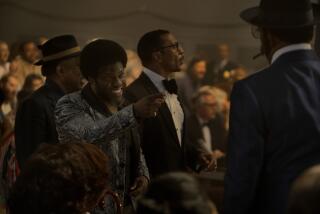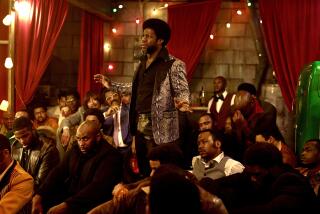Why film director Steven Zaillian is relishing his move to TV for ‘The Night of’
Reporting from New York — Oscar-winning screenwriter and part-time director Steven Zaillian has delved into the crime world over his long Hollywood career, with screenplays for “American Gangster,” “Gangs of New York” and “The Girl With the Dragon Tattoo.”
He embraces cops and criminals once more for “The Night of,” his atmospheric drama opening July 10 on HBO. But there was a big difference this time around.
“The end of two hours is, of course, usually where most movies end. And that was just the beginning — we’d go on to make what were essentially three more movies,” said Zaillian, who’s never been a key figure on a TV show before.
FULL COVERAGE: See our complete Summer TV preview
The veteran filmmaker was in a postproduction facility, looking a little dinged as he was about to commemorate an auteur-ish one-year anniversary of editing the show.
But then he paused to contemplate the advantages of an episodic format. “You can be in real time here in a way you never could be in a movie.”
You can be in real time here in a way you never could be in a movie.
— Steven âZaillian, screenwriter and director
Zaillian’s New York-set story revels in such naturalism while telling its tale of a man who is — maybe wrongly — accused. Early in the series, naïve 23-year-old Pakistani American Naz (Riz Ahmed) is arrested on suspicion of killing a wealthy young white woman. Into the picture comes defense lawyer Jack Stone (John Turturro, in full street-scrapper mode). Stone — who sees both an opportunity and a good kid — is a plucky ambulance-chaser with a whole basket of quirky traits, and an equally quirky foot malady.
Zaillian and novelist-screenwriter Richard Price (“Clockers,” “Freedomland”) wrote and created the show, adapting it from Peter Moffat’s BBC series “Criminal Justice.”
At once rigorous and languidly paced, “Night of” wallows in the details — moments, like a humiliating DNA check of a suspect — that nearly every other TV procedural would skip.
“I know what has to be there because of the plot, but I’m interested in the scenes on either side,” Zaillian said. “The waiting around, cops wanting to go home because their shift is up, the kids whose lives will be altered completely because of these little things — that’s what makes it real.”
Originally conceived as a vehicle for James Gandolfini (he has a producing credit), the project stalled for more than a year after the “Sopranos” star died, with many principals thinking it a goner. HBO was unsure of how to move ahead, or whether it wished to. “The whole thing was abandoned because no one wanted to think about it,” Zaillian said.
At one point the network cast Robert De Niro, who fell out. Then executives decided they had their man in Turturro — and, equally important, that they were ready to undertake the series without its late star and champion. Zaillian reshot the brief Stone scene from the first episode with Turturro and went from there.
The Fresno native wasn’t looking to dive into TV, and in fact was expecting to direct only the first episode. He eventually signed on for all eight and for co-writing duties too.
In keeping with his diligent-screenwriter background, Zaillian traveled to many correctional facilities, including New York’s notorious Rikers Island. He also chatted up an old contact, Richie Roberts, the detective-turned lawyer he came to know while basing Russell Crowe’s “American Gangster” character on him.
The real world details Zaillian observed and channeled into his storytelling could energize an audience accustomed to the genre’s humdrum stylizations.
Zaillian, who won a screenplay Oscar for “Schindler’s List” and was nominated for “Awakenings,” “Moneyball” and “Gangs of New York,” has had an uneven directing career — “Searching for Bobby Fischer,” “A Civil Action” and “All the King’s Men” are among his credits. Television, then, is a chance for him to experiment and showcase his skills in a way that the film world these days rarely allows for even its most reliable directors, let alone everyone else.
The result is an unusual television product (outside of “True Detective” and “Fargo” anyway: a series with a cohesive auteur feel.
For Zaillian, that also meant an unusually heavy workload, and a certain brand of cinematic rigor.
“Steve is an absolute stickler. We would shoot the placing of a teacup 20 times.” Ahmed said in a separate interview, giving a laugh. “There would even be moments when he would say to us, ‘I need to be stopped.’”
Zaillian smiled, slightly. “Well, it was all done for a reason,” he said.
Whether the rigor pays off in substance as well as style remains to be seen. But the advantage of all this precision, Zaillian believes, is that the show can migrate from entertainment to social commentary.
“The Night of” is likely to tap into the debate about criminal justice for minorities — a subject the show’s quiet pauses give viewers time to contemplate.
“Richard and I aren’t interested in doing an expose. But we are interested in treating the story in as realistic a fashion as possible,” Zaillian said. “If you do that, you can’t help seeing the flaws in the system.”
This story is part of The Times’ special summer television issue. Read more here.
More to Read
The complete guide to home viewing
Get Screen Gab for everything about the TV shows and streaming movies everyone’s talking about.
You may occasionally receive promotional content from the Los Angeles Times.







